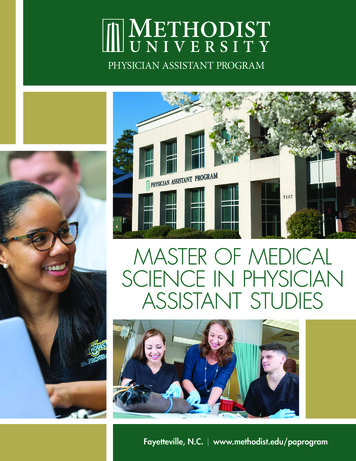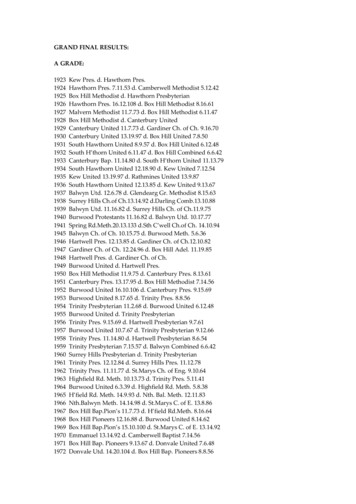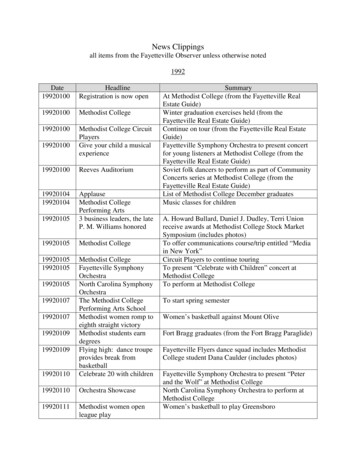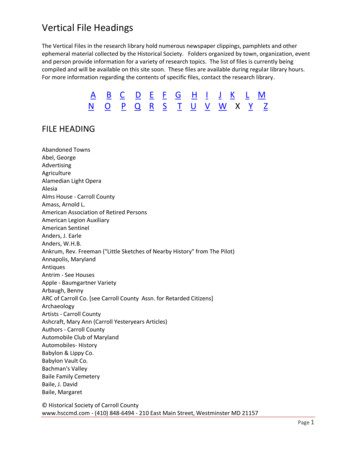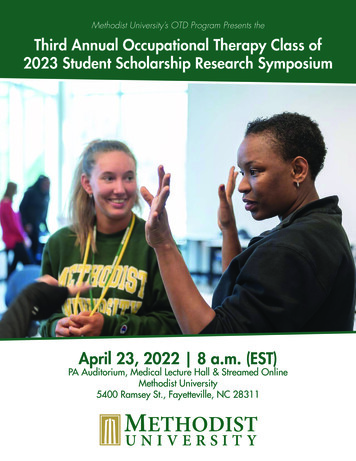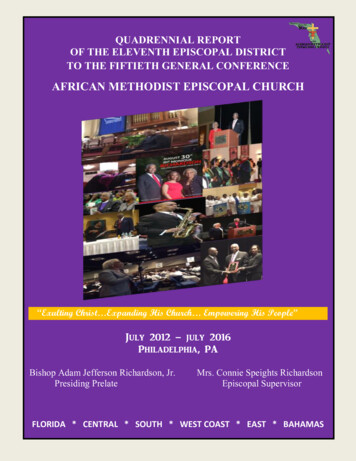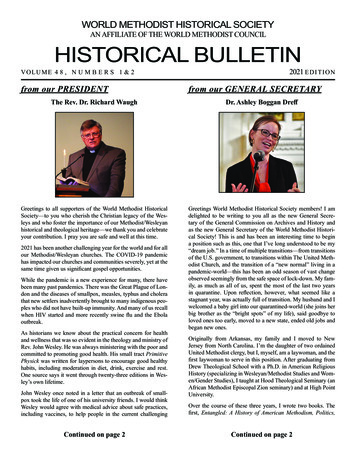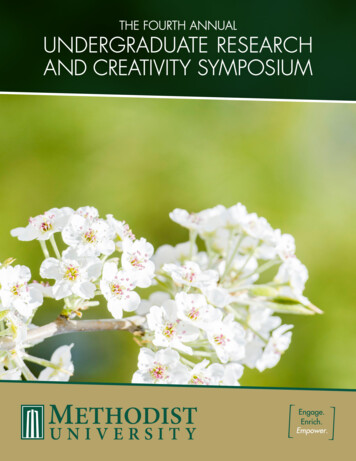
Transcription
“One of the most excitingdevelopments on our campus isthe creation of the UndergraduateResearch Symposium. Not onlydoes it feature collaborative workbetween our students and faculty,but it also sets the stage for alifetime of intellectual pursuit.”– Dr. Ben E. Hancock, Jr.President, Methodist University“I am pleased that Methodist’s Centerfor Undergraduate Research andCreativity encourages students andfaculty to collaborate on researchand creative endeavors. Faculty enjoymentoring their students, helpingstudents prepare for graduate schooland successful careers.”– Dr. Delmas S. Crisp, Jr.Executive Vice PresidentTHE FOURTH ANNUAL METHODIST UNIVERSITYUNDERGRADUATE RESEARCH AND CREATIVITY SYMPOSIUMTABLE OF CONTENTSSymposium Agenda.2Presentation Schedule.3Oral Presentations.3Morning Session.3Afternoon Session.4Poster Presentations.4Presidential Lecture Series Featuring Doris Kearns Goodwin.5Abstracts and Presenters.6Update from the Center of Undergraduate Research and Creativity.17MU Journey Information.18Monarch Review Information.21MISSION STATEMENT OF THE METHODIST UNIVERSITYCENTER FOR UNDERGRADUATE RESEARCH AND CREATIVITYThe mission of the Methodist University Center for Undergraduate Research and Creativity is toestablish educational opportunities that are collaborative and inquiry-based with the intention thatevery Methodist University student has access to exploratory learning across the curriculum.
AGENDAPRESENTATION SCHEDULEMORNING SESSIONWEEK AGENDA APRIL 13 – 17, 2015Psychology Alumni Dining RoomMonday April 1311 a.m. – noon6 – 9 p.m.Faculty PresentationsThe Second Annual Graduate Research SymposiumLocations varyPA AuditoriumTuesday April 147 – 9 p.m.Creative Writing: Poetry studentsPA AuditoriumWednesday April 158:45 a.m. – 3:30 p.m.3:30 p.m. – 5 p.m.The Fourth Annual Undergraduate SymposiumUniversity Awards CeremonyLocations varyHuff Concert Hall, Reeve Fine Arts BuildingThursday April 168 p.m.The Second Presidential Lecture Series FeaturingDoris Kearns GoodwinSocial Conformity9:55 - 10:15 a.m.The Lonely State of Mind: The Effect of Loneliness on thePerception and Learning of Negative Words10:20 - 10:40 a.m.Your Brain on Texting: How Does it Affect Learning?10:40 - 11 a.m.Additional time for questionswith student presentersFaculty PresentationsLocations varyRyan Bledsoe, Cara Cohen, Josh FranklinVolha Sviarkaltsava, Jessica PuckettAleksandra PrzuljRebekah Thompson, Lindsay StinsonEnglish/Business Hendricks 1229:30 - 9:50 a.m.The Evolution of Transcendentalism: Charles Darwin’s Rolein Early American Romantic Thought9:55 - 10:15 a.m.One Flew Over the Cuckoo’s Nest: Interdisciplinary Analysisof Ralph Ellison’s Invisible Man Using a PsychologicalInterpretation of Literature10:20 - 10:40 a.m.Ice Cream and Instagram: The Effects of Social Media onthe Food Industry10:40 - 11 a.m.Additional time for questionswith student presentersHuff Concert Hall, Reeve Fine Arts BuildingFriday April 1711 a.m. – noon9:30 - 9:50 a.m.Lin BaumeisterAshlyn DiggsKayleen-Marie SmithlingEnvironmental Management/Computer Science Hendricks 222CURC SYMPOSIUM AGENDA APRIL 15, 2015TimeEvent8:45 – 9:25 a.m.Opening Reception9:30 – 10:45 a.m.Morning Session11 – 11:45 a.m.ChapelHensdale ChapelNoon – 12:45 p.m.LunchOn your own1 – 1:30 p.m.“CURC is EPIC”1:40 – 2:25 p.m.Workshops2:30 – 3:25 p.m.Afternoon Session2:30 – 3:25 p.m.Poster Session3:30 – 5 p.m.University Awards Ceremony2LocationReeves Fine Arts Building lobbySee program for locations9:30 - 9:50 a.m.Monarch Creek Stream Project9:55 - 10:15 a.m.Will You Pass the Salt and Benzoic Acid, Please?Sharon Moran10:20 - 10:40 a.m.Shielder 3.0 Content Generator for C#/XNA GamesBryan Bennett10:40 - 11 a.m.Additional time for questionswith student presentersEconomics Reeves G59:30 - 9:50 a.m.Drug War in Guatemala: A Case StudyHendricks Science Building 2229:55 - 10:15 a.m.Hendricks Science Building 222Capital Control Institutions and Externalities: ProgressiveTax Policy in the Global Economy10:20 - 10:40 a.m.Trans-Pacific Partnership Agreement: Impacts on Blue-CollarWorkers in the American Workforce and Abroad10:40 - 11 a.m.Additional time for questionswith student presentersSee program for locationsBerns Student CenterHuff Concert HallThe Fourth Annual Undergraduate Research and Creativity SymposiumNick Baggett, Nicole SpinkCameron Baggett, Christopher WebsterRebecca BurnettAlexander DemitraszekPatrina LowrieHealth Care Administration/Accounting Nursing 1039:30 - 9:50 a.m.Veteran’s Health Care System: The Strategic Approach forThose Who Served9:55 - 10:15 a.m.The Future of Family Practice in Fayetteville, NC for theComing Decade10:20 - 10:40 a.m.Benford’s Law: An Insight Into Fraud Investigation10:40 - 11 a.m.Additional time for questionswith student presentersThe Fourth Annual Undergraduate Research and Creativity SymposiumDonnie Fann, Emilie Ingram, Aaron O’NeilKaitlin Tart, Shiva SharmaMiguel da Silva GuterresOlorato Condrad Mbi3
PRESENTATION SCHEDULEPRESENTATION SCHEDULEPRESIDENTIAL LECTURE SERIESAFTERNOON SESSIONChemistry Alumni Dining Room2:30 - 2:50 p.m.Concise Synthesis of Chiral Diflourinated EpihirsutanonolAnd Related Analogues2:55 - 3:15 p.m.Quantitative Analysis of Potassium and Acetic Acid inVarious Substances Used by Athletes for Rapid MuscleCramp ReliefAdditional time for questionswith student presenters3:15 - 3:30 p.m.Mariama JabatiTaylor TiptonDORIS KEARNS GOODWINPresidential Historian and Pulitzer Prize-winning AuthorBiology/Psychology Hendricks 1222:30 - 2:50 p.m.2:55 - 3:15 p.m.3:15 - 3:30 p.m.Comparative Analysis of Vibrio Abundance and VirulenceGene Frequencies Between Mercenaria Mercenaria andCrassostrea Virginica in North CarolinaCombating Trauma on Campus: A Brief AcademicInterventionAdditional time for questionswith student presentersSteven MoranLindsay Stinson, Rebekah ThompsonChelsea SmithFeaturing a special presentation on“Leadership Lessons from the White House”8 p.m. Thursday, April 16, 2015Huff Concert Hall, Reeves Fine Arts BuildingBiology Hendricks 2222:30 - 2:50 p.m.Creating an Automatic Neural PathwayJohn Hoover2:55 - 3:15 p.m.How the “Adrenaline Rush” Effects “Muscle Memory”3:15 - 3:30 p.m.Additional time for questionswith student presentersMichael BridgemanCommunications/Leadership Reeves G52:30 - 2:50 p.m.2:55 - 3:15 p.m.Bridging the Divide Between Theory and Practice Leads tothe Development of Effective LeadershipAdditional time for questionswith student presentersJustin Wells, Joshua Lee, Joey TaylorSydney Bryan, Kylie ArauzPOSTER SESSIONStudents will be standing by their posters between 2:30 - 3:25 p.m.Establishing the Dorsal Axis: The Beta-Catenin Protein and its Importance in EarlyEmbryological Development of Lithobates Pipiens (Northern Leopard Frog)Cocaine Cutting Agent IdentificationGabriel GawedaAlkaloids in Poisonous Plants Negatively Effecting LivestockErika HenriksenAmount of Money Spent on Alcohol and its Relationship to Alcohol ConsumptionRetention of MU Football Players4Isabella Tuveri, Jasmine SmithBrandon JohnsonA Greener More Sustainable Methodist University Through Permeable PavementPracticality of the Use of Drones in Documenting Crime ScenesNicole HardinSharon Moran, Makayla CrawleyKelsey Harrington, Krista ZentnerThe Fourth Annual Undergraduate Research and Creativity SymposiumABOUT DORIS KEARNS GOODWINDoris Kearns Goodwin, world-renowned historian, has been reporting on politics and baseball for over twodecades. Goodwin is the author of several books and has written for leading national publications. She appearsregularly on network television programs and was an on-air consultant for PBS documentaries on Lyndon B.Johnson, the Kennedy Family, Franklin Roosevelt, and Ken Burns’ The History of Baseball. She was the firstfemale journalist to enter the Red Sox locker room.Her most recent work, a monumental history of Abraham Lincoln entitled Team of Rivals: The Political Geniusof Abraham Lincoln, published in October 2005, joined the best-seller lists on its first week in publication,and soon reached #1 on the New York Times Best-Seller List. Team of Rivals won the 2006 Lincoln Prize foran outstanding work about the president and/or the Civil War, the New York Historical Society Book Prize,the Richard Nelson Current award, and the New York State Archives History Makers Award. When PresidentObama was asked if he could only bring one book to the White House other than the Bible what would it be, hesaid Team of Rivals. A feature film based on Team of Rivals, directed by Steven Spielberg and starring Daniel DayLewis as Lincoln, was released in 2012.This event is free and open to the public. Seating is available on a first-come, first-served basis.For more information, call 910.630.7243.The Presidential Lecture Series is made possible through the generosity of community partnersBB&T; City Center Gallery & Books and Diane & Hank Parfitt; The Fayetteville Observer; First Citizens Bank;Rosalind and Terry Hutchens; Lafayette Ford Lincoln; and Daphne and Ray Manning.The Fourth Annual Undergraduate Research and Creativity Symposium5
ABSTRACTSABSTRACTS(In order by session, room, and time)(In order by session, room, and time)MORNING SESSION PSYCHOLOGY ALUMNI DINING ROOMMORNING SESSION ENGLISH & BUSINESS HENDRICKS 1229:30 – 9:50 a.m.9:30 – 9:50 a.m.Social ConformityThe Evolution of Transcendentalism: Charles Darwin’s Rolein Early American Romantic ThoughtRyan Bledsoe Senior, Psychology with a concentration in Clinical and Counseling Fayetteville, N.C.Cara Cohen Senior, Psychology Virginia Beach, Va.Josh Franklin Senior, Psychology Scranton, Pa.Mentor: Dr. Katharine SnyderSocial conformity is a universal phenomenon. Social conformity takes place when an individual adheres to the beliefs or actionsof a group in order to fit in. Various studies have shown that conformity takes place in individuals of all ages. Essentially, humansare social creatures who thrive on acceptance. This study will seek to measure social conformity based on the audience members’observations of actors who are performing variations of scenarios of athletes abusing steroids and/or students abusing Adderall, alongwith confederate students posing as classmates. The hypothesis is that the participants will conform to the views of the confederatesaccording to the informational influence type of conformity (Asche & Crutchfield, Schnuerch & Henning, 2014). The participants willwitness the confederate video “audience” and will adhere to their beliefs as a source of authority.9:55 – 10:15 a.m.The Lonely State of Mind: The Effect of Loneliness on the Perceptionand Learning of Negative WordsVolha Sviarkaltsava Junior, Psychology Minsk, BelarusJessica Puckett Senior, Psychology with a concentration in Counseling Minneapolis, Minn.Aleksandra Przulj Senior, Psychology with a concentration in Counseling and Clinical PsychologySokolac, Bosnia and HerzegovinaMentor: Dr. Katharine SnyderA very important component of research is emotional learning. Previous research has shown that negative words are learned quicker andremembered longer. It was hypothesized that individuals who obtain low scores on the loneliness scale would remember negative wordsbetter than individuals with high scores. The Auditory Affective Verbal Learning Test (AAVLT) and the UCLA loneliness scale wereused to examine the impact of loneliness on learning emotional words. Specifically, the AAVLT included positive, negative and neutralword lists. It was predicted that the recall of negative words, for those who score high on the UCLA scale, would be greatest for the firstfive words on the negative list due to enhanced primacy effects (Snyder and Harrison, 1998). Results revealed that recall of the first fivenegative words was significantly higher than recall of the first five positive and neutral words. A significant increase in word recall fromTrial 1 to Trial 5 was also found. A lack of correlation between the UCLA score and word lists will be discussed.Lin Baumeister Sophomore, English and History Fayetteville, N.C.Mentor: Dr. Walter CarneyCharles Darwin, throughout his life, saw himself primarily as a naturalist, just as Henry David Thoreau saw himself. While theinfluence of his scientific discoveries remains monumental to modern biological thought, much of Darwin’s writing suggests that wehave neglected the romantic value of his work. His autobiography, in particular, echoes Thoreau’s Walden, and his most well-knowntext, On the Origin of Species, published four years after Walden, demonstrates many of the same transcendentalist themes. Whilethere is little evidence to suggest that Darwin would have had any familiarity with the works of Thoreau or other American writers,he certainly had an impact on their works. The closeness of their ideas, especially regarding the natural world, are a clear indicatorthat this romantic thought was a result of the enlightenment philosophy that had dominated western thought. This paper explores therelationship between the men and their ideas through their most well-known works, and how these all come together as part of theTranscendentalist tradition.9:55 – 10:15 a.m.One Flew Over the Cuckoo’s Nest: Interdisciplinary Analysis of Ralph Ellison’s Invisible ManUsing a Psychological Interpretation of LiteratureAshlyn M. Diggs Senior, Psychology Panama City, Panama & Charlotte, N.C.Mentor: Dr. Walter CarneyScientific racism focuses on the resources, the conditions, and the strategies of science in the 20th century. To explain scientificracism, an interpretative analysis of Ralph Ellison’s, Invisible Man, will be used to transport the audience to the 1940’s, and illuminatethe procedural misuse of Electroconvulsive Treatment (ECT) as it applies to the novel. The investigation will emphasize underlyingmotivations of scientist that are not practical for empirical research. Technological advances like ECT co-exist as an avenue forexplaining how ECT developed, and how ECT may have affected the unnamed protagonist’s daily function. The unnamed protagonistwill become victim to a factory hospital, in America, during a period of revolutionary protest against discrimination in industries.The main character offers the reader a valuable insight on the procedure from the patient perspective.10:20 – 10:40 a.m.Ice Cream and Instagram: The Effects of Social Media on the Food Industry10:20 – 10:40 a.m.Your Brain on Texting: How Does it Affect Learning?Rebekah E. Thompson Senior, Psychology with a concentration in Clinical and Counseling Psychology Armstrong, Mo.Lindsay Stinson Senior, Psychology with a concentration in Clinical Psychology Fayetteville, N.C.Mentor: Dr. Katharine SnyderPrevious studies have demonstrated that increased cognitive load from conversational texting during an academic lesson increaseserrors on tests of lesson material presented. It was hypothesized that a student’s level of cell phone reliance could further affect thelevel of increased errors. Undergraduate students were recruited for participation and were randomly assigned to control, mixed, andtreatment conditions. Participants in all conditions completed the Cell Phone Reliance Scale (CPRS) then viewed the same 17-minuteTEDx lecture. The mixed and treatment conditions included the receipt of text messages by some or all participants, respectively,transmitted by a researcher outside the classroom. These text messages were randomly assigned to participants using the RandomNumber Generator app and sent at approximately four minute intervals during the video lecture. After the video, participantscompleted a twenty question quiz on the lecture material. It was predicted that quiz scores of control group participants would besignificantly higher than those in the mixed and treatment conditions. Further, it was anticipated that quiz scores in the mixed groupto be higher than those in the treatment group. No significance was found due to high variability in the constructs. It is believed thatthese findings are due to the few participants who responded to texts while viewing the lecture. Results found a significant correlationbetween CPRS score and participant age. The implication of this finding and suggestions for future research will also be discussed.6The Fourth Annual Undergraduate Research and Creativity SymposiumKayleen-Marie Smithling Junior, Business Administration with a concentration in Resort and Hospitality ManagementFayetteville, N.C.Mentor: Dr. O.Z. HamzahFood has always been a means of nourishing the body and a focal point for human social interaction, both of which are deemednecessary for human development. What Abraham Maslow defined as a physiological need has evolved from a necessity to anobsession, and the effects of such a revolution have illustrated a means of transforming the food industries in the 21st century. Thispaper will delve briefly into an explanation of the modern day implications of social media as an influence on the food industries. Themain focus of this study is how the analysis of modern social networks displays food as a vehicle for marketing, globalization, andartistic expression. The negative effects of this “foodie” phenomenon will also be evaluated, namely its effects on body imagery.The Fourth Annual Undergraduate Research and Creativity Symposium7
ABSTRACTSABSTRACTS(In order by session, room, and time)(In order by session, room, and time)MORNING SESSION ENVIRONMENTAL MANAGEMENT & COMPUTER SCIENCE HENDRICKS 222MORNING SESSION ECONOMICS REEVES G59:30 – 9:50 a.m.9:30 – 9:50 a.m.Monarch Creek Stream ProjectNick Baggett Junior, Environmental and Occupational Management Dunn, N.C.Nicole Spink Junior, Environmental and Occupational Management Havelock, N.C.Cameron Baggett Sophomore, Environmental and Occupational Management Dunn, N.C.Christopher Webster Senior, Environmental and Occupational Management Andrews, N.C.Mentor: Dr. Deb BransonSediment is the number one pollutant of streams, lakes, and rivers in North Carolina. Students at Methodist University have a uniqueopportunity to study sedimentation and erosion thanks to the small stream that flows through campus and empties into the Cape FearRiver. The stream, named Monarch Creek, is the main outflow for all of the storm water run off from campus. The volume of waterthat is directed into the stream during a rain event has caused significant erosion and sedimentation in the Cape Fear. As ENM majors,researchers are extremely interested in pollution and storm water control measures. For the last two years researchers have beenmonitoring the sedimentation and erosion on campus. This research project covers the main causes of sedimentation, the effects, andsome controls that can be put in place to help mitigate the effects of sedimentation.9:55 – 10:15 a.m.Will You Pass the Salt and Benzoic Acid, Please?Sharon Moran Freshman, Environmental Science with a concentration in Regulatory Compliance St. Pauls, N.C.Mentor: Professor Megan RobertsThe development of agriculture is the greatest technological advancement of humans. In the 20th and now the 21st century, food canbe stored, saved, transported across the oceans, and cooked at the consumer’s convenience due to the additives that are added tofood. According to research, although most additives are regulated today, whether an additive causes harm is still in question by somescientists. By avoiding additives, humans avoid exposure to the harm additives have been shown to cause, but it is the responsibilityof the federal Food and Drug Administration (FDA) to make information concerning additives available to the public so that eachperson can make well-informed decisions about whether to consume foods that contain additives.10:20 – 10:40 a.m.Shielder 3.0 Content Generator for C#?XNA GamesBryan Bennett Senior, Computer Science Fuquay-Varina, N.C.Mentor: Dr. Terry HouseShielder 3.0 (henceforth Shielder) is a game content generator for games written in C# and especially for those created with theXNA framework. Generating content for games can be done a number of ways; one can format a text file a certain way with contentinformation or one can hard-code the content in the game, neither of which is recommended due to their time-consuming nature.Shielder attempts to solve this problem by providing the game developer with an interactive GUI that streamlines the contentgeneration as well as a C# library that allows quick and efficient import of such content into the target game. The entire process ofadding content to a game is called the content pipeline. Any increase in speed (without reducing accuracy) of the content pipelineallows game developers to easily and efficiently iterate game builds.8The Fourth Annual Undergraduate Research and Creativity SymposiumDrug War in Guatemala: A Case StudyRebecca Mae Burnett Junior, Global Studies with a concentration in Business & Economics East Wenatchee, Wash.Mentor: Dr. Spencer DavisThis research paper will focus on the Drug War in Guatemala as a case-study and aims to demonstrate, through research, thatrevisions of current drug-related laws could improve the economic and political problems that Guatemala is currently facing. Findingsindicate that the current laws regarding drugs in Central America only empower the drug cartel, which make them a greater threatto governments and citizens, and allows them to thrive on the massive economic gains that could instead circulate within the legaleconomic sphere.9:55 – 10:15 a.m.Capital Control Institutions and Externalities: Progressive Tax Policy in the Global EconomyAlexander Demitraszek Junior, Financial Economics Albany, N.Y.Mentor: Dr. Matthew DobraGlobalization has increased the ease and pace with which capital can move. As a result, capital is much more sensitive to the seenand unseen effects of certain institutions and policies. Excessive taxation policies, combined with this global environment haveincreased the likelihood of capital flight and tax competition. Taxation is popularly believed to serve as government’s main sourceof revenue. It’s also fallaciously believed that through the institution of taxation, society can combat income inequality. Contrary tothese assumptions; excessive taxation and income redistribution policies have resulted in many negative and inefficient economicand societal outcomes. Like most government institutions and policies, taxation is likely to result in negative externalities; as theinefficiencies related to rent seeking become apparent. Due to the deadweight losses associated with taxation and the rising scope ofgovernment, fiscal churning, tax competition, and migration in reaction to tax policies have become increasingly evident, threateningthe well-being and efficiency of society.10:20 – 10:40 a.m.Trans-Pacific Partnership Agreement: Impacts on Blue-Collar Workers in the AmericanWorkforce and AbroadPatrina Anastasia Lowrie Senior, Business Administration Montego Bay, JamaicaMentor: Dr. Spencer DavisTrans-Pacific Partnership Agreement (TTP) is a regional trade agreement that the United States is negotiating with 11 other AsiaPacific countries (Australia, Brunei, Canada, Japan, Malaysia, Mexico, New Zealand, Peru, Singapore, and Vietnam). The TTPagreement would be a signature trade agreement for the 21st century; since the regions involved would represent more than half of theglobal output. One of the goals of TTP is to produce a comprehensive and high standard agreement that supports jobs; nevertheless,in free trade agreements, for example the North American Free Trade Agreement (NAFTA) there is a tendency of lost jobs in themanufacturing industry in the American workforce and a net gain of manufacturing jobs in the foreign country. As a result, bluecollar workers would be impacted the most by TTP, which somewhat replicates the NAFTA model.The purpose of this research is to demonstrate how TTP will have a significant impact on the American workforce as well as in theforeign countries’ manufacturing industry. Blue-collar workers in the manufacturing industry in the United States (U.S.) are mostlikely to be impacted by TTP because there are an increasing number of displaced blue-collar workers in the U.S. In addition, workersin the manufacturing industry in foreign countries are expected to have a net gain of jobs in the manufacturing sector because mostmanufacturing plants in the U.S. are closed or the production facility is relocated overseas. Ultimately, these results will be beneficialin determining whether or not the trade negotiations in the TTP will benefit blue-collar workers domestically and abroad. It will alsoallow for further research of how the U.S. exports, trade deficits, and tariffs also play an active role in free trade agreements.The Fourth Annual Undergraduate Research and Creativity Symposium9
ABSTRACTSABSTRACTS(In order by session, room, and time)(In order by session, room, and time)MORNING SESSION HEALTH CARE ADMINISTRATION & ACCOUNTING NURSING 103AFTERNOON SESSION CHEMISTRY ALUMNI DINING ROOM9:30 – 9:50 a.m.2:30 – 2:50 p.m.Veterans’ Health Care System: The Strategic Approach for Those Who ServedConcise Synthesis of Chiral Diflourinated Epihirsutanonol and Related AnaloguesDonnie Fann Senior, Health Care Administration Salemburg, N.C.Emilie Ingram Junior, Health Care Administration Louisville, Ky.Aaron O’Neil Junior, Health Care Administration Gloucester, Va.Mentor: Dr. Eun Hoo KimMentor: Dr. Warren McDonaldThis presentation explores the Veterans Affairs (VA) health care system, both locally and nationwide, and the strategic measuresbeing implemented to better provide health care services to our military veterans. A look at past strategies will help provide anunderstanding to the present state of the Va. and what strategic direction it will move toward in the future. Focusing on these factors,we will determine their effects to the VA Medical Centers, clinics, and patients in Fayetteville, North Carolina (N.C.), as well as thestate and nation overall. The VA health care system has served our military veterans for close to a century and has required strategicchanges in operations to keep pace with the wars that have followed and provide care to the veterans affected by those wars. With therecent negative news circulating about the VA, new strategies and approaches to the health care system are being approached andanalyzed. This could create a significant impact on the care the VA provides. While it is not clear what impact these changes will have,this research will better enable us to understand the new strategic direction of the VA and how the strategy will help veterans. Themain goal of this research is to raise positive awareness to the VA health care system and the strategy for maintaining the largest singlehealth care system in the country.Mariama Jabati Senior, Chemistry with a concentration in Biochemistry Freetown, Sierra LeoneFluorinated organic compounds are gaining prominence in a number of research fields like drug modifications, biomedical imagingand material science. In this research, a concise approach to synthesize Diflourinated Epihirsutanonol and related Diarylheptanoidvia mild release of Trifluoroacetate. Diflourinated Epihirsutanonol 5 will be synthesized from commercially available 3,4-dihydroxyhydrocinnamic acid 1 that will produce key intermediates 3 and 4. Aldehyde 3 will be produced via reduction followedby Swern oxidation of compound 1. Intermediates 3 and 4 will then be used to prepare titled compound 5 by aldol reaction with mildrelease of Trifluoroacetate. Pure (R)-5 and (S)-5 Epihirsutanonol will be prepared using N-Boc-L -proline coupling and then columnpurified. Biological activities will be tested by co-work with oriental medicinal specialists.9:55 – 10:15 a.m.The Future of Family Practice in Fayetteville, N.C. for the Coming DecadeKaitlin Tart Sophomore, Pre-Nursing Benson, N.C.Shiva Sharma Senior, Health Care Administration Syracuse, N.Y.Miguel da Silva Guterres Sophomore, Health Care Administration Baucau, East-TimorMentor: Dr. Warren G. McDonaldThe purpose of this research is to forecast the future of family practice in Fayetteville, N.C. for the coming decade. Methods of researchinclude SWOT Analysis (strengths, weaknesses, opportunities, and threats); Service Area Competitor Analysis (define the servicecategories, define the service areas,
3:30 p.m. - 5 p.m. University Awards Ceremony Huff Concert Hall, Reeve Fine Arts Building Thursday April 16 8 p.m. The Second Presidential Lecture Series Featuring Doris Kearns Goodwin Huff Concert Hall, Reeve Fine Arts Building Friday April 17 11 a.m. - noon Faculty Presentations Locations vary MORNING SESSION Psychology Alumni .


